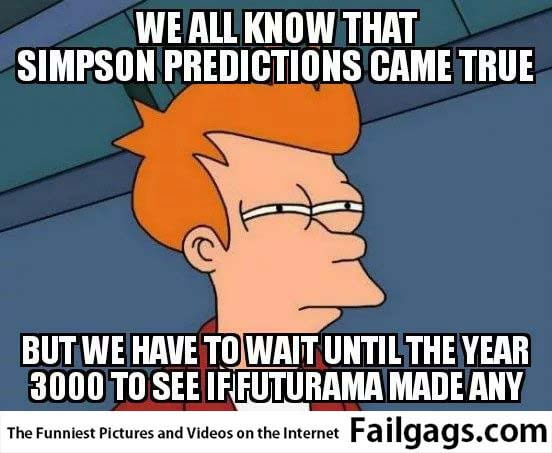Netflix's Black Mirror: 5 Chilling Predictions That Came True

Table of Contents
The Rise of Social Media Manipulation and "Nosedive" Reality
The Black Mirror episode "Nosedive" depicts a society obsessed with social ratings, where individuals' lives are dictated by their online reputation. This seemingly futuristic concept resonates deeply with our current anxieties surrounding social media influence. The episode's portrayal of a meticulously crafted online persona, where even minor infractions lead to devastating consequences, mirrors the very real pressure to maintain a perfect online image in our social media-driven world.
- The impact of social media algorithms on shaping perceptions: Algorithms curate our feeds, exposing us to information that reinforces our existing biases and creating echo chambers.
- The rise of online review systems and their influence on businesses and individuals: Reviews significantly impact businesses' success and can even influence personal relationships and career prospects.
- The increasing pressure to maintain a perfect online persona: The fear of negative online feedback drives many to carefully curate their online presence, often at the expense of authenticity.
- Examples of real-world instances of social media manipulation and its consequences: From targeted political advertising to the spread of misinformation, social media manipulation is a growing concern with significant real-world impacts. The pressure to maintain a high social media “score” directly relates to the anxieties portrayed in “Nosedive.”
Surveillance Technology and "White Bear" Implications
"White Bear," another unsettling Black Mirror episode, portrays a technologically advanced surveillance state where individuals are subjected to public shaming and punishment. This dystopian vision is increasingly relevant in our world of pervasive CCTV cameras, facial recognition software, and widespread data collection. The episode forces us to confront the ethical implications of mass surveillance and the potential for misuse of personal data.
- The ethical considerations surrounding mass surveillance: The balance between security and individual privacy is a constant debate, exacerbated by the increasing capabilities of surveillance technology.
- The potential for misuse of surveillance data: Data breaches and the potential for government overreach are major concerns.
- Examples of real-world surveillance controversies and breaches of privacy: The Snowden revelations, facial recognition controversies, and the use of surveillance technology by law enforcement all highlight the real-world dangers explored in "White Bear."
The Dangers of Algorithmic Bias and "Bandersnatch" Choice
Black Mirror's interactive film "Bandersnatch" explores the concept of free will versus algorithmic determination, raising questions about the influence of algorithms on our lives. This ties directly into the growing concern about algorithmic bias in various aspects of society. Algorithms, while intended to be objective, often reflect and amplify existing societal biases.
- Examples of biased algorithms and their discriminatory outcomes: Algorithmic bias has been shown to impact areas like criminal justice (predictive policing), hiring practices, and loan applications, disproportionately affecting marginalized communities.
- The challenges in creating unbiased AI systems: Developing truly unbiased AI requires careful consideration of data sets, algorithms, and ongoing monitoring.
- The importance of transparency and accountability in algorithmic decision-making: Understanding how algorithms work and holding those responsible for their development accountable is crucial to mitigating the risks of bias.
The Blurring Lines of Reality and Virtual Reality in "Playtest"
"Playtest" explores the immersive nature of virtual reality (VR) and augmented reality (AR) technologies, highlighting the potential blurring of lines between reality and simulation. This episode's predictions are already being realized with the rapid advancement of VR/AR technology.
- The rising popularity of VR and AR gaming: The gaming industry is embracing these technologies, creating increasingly immersive and engaging experiences.
- The potential risks associated with excessive use of immersive technologies: Concerns about addiction, mental health impacts, and the potential for social isolation are becoming increasingly relevant.
- The ethical considerations surrounding the development and use of VR/AR: Questions of safety, accessibility, and the potential for misuse need careful consideration.
The Impact of Technological Dependence and "Fifteen Million Merits"
"Fifteen Million Merits" paints a bleak picture of a society trapped in a cycle of consumerism and technological dependence, highlighting the potential negative consequences of excessive reliance on technology. This resonates with the anxieties many feel about our increasing dependence on technology and its impact on our mental well-being and social interactions.
- The impact of social media on mental health and well-being: Studies have linked excessive social media use to increased anxiety, depression, and feelings of inadequacy.
- The addictive nature of technology and its influence on behaviour: Technology is designed to be engaging, and its addictive nature can negatively impact productivity, relationships, and overall well-being.
- The importance of maintaining a healthy balance between technology and real-life interactions: Consciously limiting technology use and prioritizing real-world connections is crucial for maintaining mental and physical health.
Conclusion:
From the manipulative power of social media ratings in "Nosedive" to the chilling implications of pervasive surveillance in "White Bear," Black Mirror has consistently and unsettlingly predicted aspects of our technologically advanced world. The show's explorations of algorithmic bias, the immersive nature of virtual reality, and the dangers of technological dependence all serve as stark warnings about the potential downsides of unchecked technological progress. Has Black Mirror predicted your reality? Dive into the chilling world of Black Mirror on Netflix and see for yourself what other unsettling predictions await.

Featured Posts
-
 Padel Courts Expansion Dragon Den Stars Investment In Chafford Hundred
May 31, 2025
Padel Courts Expansion Dragon Den Stars Investment In Chafford Hundred
May 31, 2025 -
 Glastonbury On A Budget Pro Tips And Essential Item To Save Money
May 31, 2025
Glastonbury On A Budget Pro Tips And Essential Item To Save Money
May 31, 2025 -
 Banksy In Dubai A World News Report On The Inaugural Exhibition
May 31, 2025
Banksy In Dubai A World News Report On The Inaugural Exhibition
May 31, 2025 -
 Sanofi Quel Potentiel Boursier Reste T Il L Analyse De Loeil Du Loup De Zurich
May 31, 2025
Sanofi Quel Potentiel Boursier Reste T Il L Analyse De Loeil Du Loup De Zurich
May 31, 2025 -
 The Role Of Algorithms In Mass Shooter Radicalization Corporate Responsibility
May 31, 2025
The Role Of Algorithms In Mass Shooter Radicalization Corporate Responsibility
May 31, 2025
